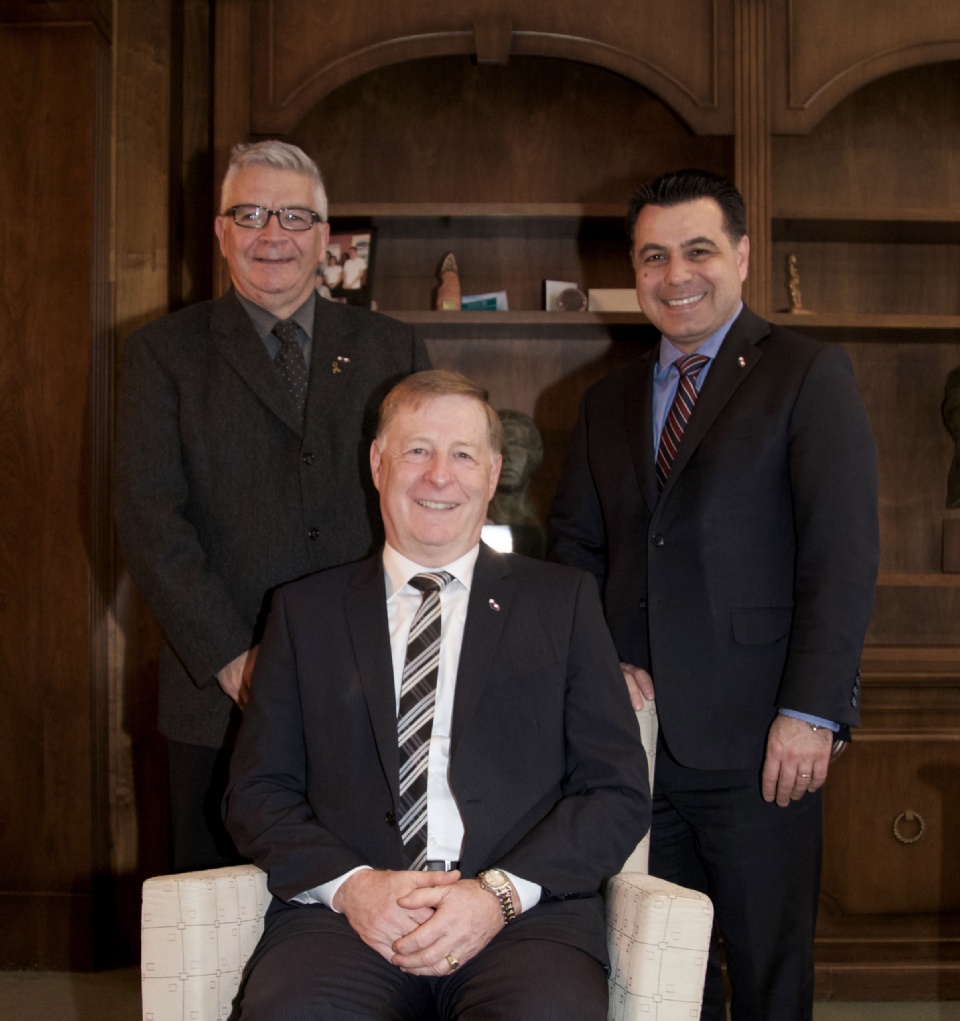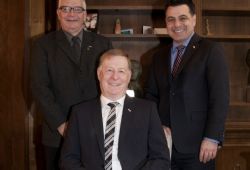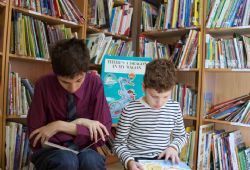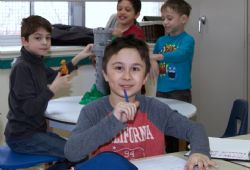Following
a pioneering announcement in 2015 of a partnership with Giant Steps School in
Montreal, the city of Laval is now well on its way to earning the title of the
first autism-inclusive city in Quebec, and perhaps even in Canada. All key areas of community and citizen life
are slated for improvement for children and adults with autism, such as public
transit, housing, employment, education, health, tourism and the
arts/entertainment.
In
just the few short months following the announcement, the city has blazoned a
path towards achieving this goal by launching into the first phase of the
transformation; training emergency service responders such as police officers
and firefighters to better respond to the needs of people with autism in an
emergency situation. In addition to ongoing
training for emergency personnel, the Société
de transport de Laval
(STL) has also taken on initiatives through awareness programs for their
drivers.
“People with
autism are able to grow and contribute to society but they sometimes need to be
approached in a particular way that better suits their needs,” says Mayor of
Laval, Marc Demers.
A Round-Table Discussion
Though some major
cities in Canada and the U.S. have begun small steps towards creating more
inclusive activities for citizens, belief that more could be done here for
people with autism and their families was born out of a discussion that took
place a few years ago at a conference hosted by Andre Pereira, co-founder of Montreal Autism in Motion. Pereira, who is Vice-President of the Board
of Directors at Giant Steps and father of an eight year old boy with autism,
brought together leaders of various community organizations, parents and other
stakeholders. The idea was to reach out
to municipalities to discuss what could be done through a large-scale movement
aimed at improving all aspects of everyday life for those with autism.
At
that meeting was Nicholas Katalifos, Chair of the Board of Directors at Giant
Steps. Katalifos, who is also principal at
Roslyn Elementary School and the father of a 14 year old boy with autism, knew
that this was a cause he wanted to support in any way he could, so he
approached Vice-Mayor of Laval, David De Cotis.
“The idea was to work with the municipality to make it a truly
integrated and inclusive type of city as far as people with autism are
concerned,” says Katalifos.
De
Cotis was on board immediately, and set up a meeting between Pereira, Katalifos
and Mayor Demers, where an initial
presentation was made outlining how municipalities can better serve the needs
of this diverse population. The Mayor’s
cabinet did not hesitate to give the project the green light, and as a result,
several initiatives are already underway and more are in the works to touch on
all key areas of community living. “This is the first major municipality in
Canada, to our knowledge, to take on an initiative like this to this extent,”
says De Cotis.
Beyond Education
Giant
Steps is the only private education institution in Quebec that caters
exclusively to students with autism spectrum disorders. According to Seiun Thomas Henderson, Director
General of Giant Steps, education programs in both the private and public
sectors have come a long way since the early 1990s, but still more is needed to
better respond to the needs of students with autism. What’s more, Henderson explains that the need
for a true inclusive city must be looked at through the lens of students eventually
becoming adults in society and “aging out” of many of the services already in
place for youth.
“There
are questions of access and inclusiveness that go beyond education and special
needs services,” says Henderson. “We are
looking at accessibility legislations that are established on a municipal level
that are designed to support people with disabilities broadly, but these don’t really reflect the needs of a population
like people with autism, whose needs can be profoundly different.”
Laval Police &
Firefighters Undergoing New Training
The
first phase of Laval’s inclusion project is all about training emergency
responders, which includes police officers and firefighters across the
city. “As a police department, we serve
a very diverse clientele and we have multiple interactions on a daily basis
with the citizens of Laval. It’s
important for us to be able to know how to better react and interact with
children and adults with autism,” says Pierre Brochet, Laval’s Chief of Police.
Over the course of 2016, Laval officers and agents will be receiving ongoing
training and strategies for this purpose, including working with other
municipal agencies to implement an adapted procedure in arresting or
approaching individuals with autism. Laval
currently has a system in place in which civil employees under the umbrella of Urgence Social are already trained to be
called upon 24-7 to help an officer better communicate/interact with a citizen
with challenges, such as those associated with people with autism.
Last
November, approximately 20 fire department captains across Laval received a
special autism awareness training provided by the Giant Steps Resource &
Training Center, which was then followed by an internal training of 80
firefighters last December. According to
Laval Fire Chief Robert Séguin, by July 2016 over 280 firefighters across the
city will have received specialty training aligned with the inclusive city
project. “Our goal is to understand the
different forms of autism and how to best respond to people with autism in an
emergency situation and get them out safely,” explains Séguin.
A
Montreal-based artist with autism who is known by the name Remrov, is also on
the Board of Directors at Giant Steps as a community
representative, and has been consulted on certain aspects of this city-wide
project. “First responders in general
and doctors in hospitals need to know more about autism. It is very important
that they recognize certain behavior as autistic instead of threatening or
disrespectful,” explains Remrov. “They
need to know how to communicate with people with autism, and how they can calm
a person down who is in distress.”
Both
Brochet and Séguin outline plans for Laval to create a voluntary registry,
similar to one Ottawa implemented in 2010, that would allow first responders to
have access to information about the residents in a particular area, creating a
scenario in which they can better plan the intervention required, knowing in
advance that there is child or adult with autism at the location in
question. Séguin explains that with the
ongoing training, firefighters now have a better idea of how a person with
autism may or may not react to an emergency situation. “This awareness campaign serves to give all
first responders the basic tools and strategies needed to respond appropriately
to this group of citizens,” adds Séguin.
Public
Transportation
As the use of public transportation can sometimes be a difficult and
chaotic experience for people with autism, the STL has also begun implementing
initiatives in the city-wide project of inclusiveness. “When we were
approached in 2015 about this project, we were interested right away in being implicated
because the idea already aligned with our own vision of making the STL even
more accessible for those with various challenges,” says Sylvain Yelle, STL’s Director
General.
In addition to the basic
training already provided, 2016 will see ongoing training for all STL drivers
in the context of autism awareness. On
several occasions this year, the STL provided informational kiosks outlining
this campaign and giving drivers an additional forum to address their questions
and improve their knowledge base.
Yelle notes that later in
2016, the STL will launch a new mobile app called STL Compagnon, which has been designed to help people with certain
challenges, such as those associated with autism, better navigate the city
using public transport services. “Laval
has a strong will to meet the needs of people with autism and their families,”
says Yelle.
Work Force
Though
people with autism have particular talents and strengths that make them an
asset to a variety of businesses, many adults with autism struggle to find or
keep employment in the long term. “We
have to focus on the adults with autism in our community who want to play a
role in society and work, and part of this cause is to support that,” says
Katalifos. “We will work together with
other advocacy groups and adults with autism to support this cause.”
Raynald Adams, a
Laval City Councillor, notes that the city is working to create a partnership
with the Chamber of Commerce to highlight this area. A conference slated to take place in late
2016 will be dedicated to the topic of employment opportunities for adults with
autism and other challenges, and the hope is that local businesses will
participate, thereby continuing the spirit of awareness. Adams, who is also Chairman of Laval’s
Advisory Committee on accessibility and a member of the Executive Committee,
explains that people with autism may require some special considerations in the
workforce, but that their talent and skill is currently underrepresented. “An inclusive city for people with autism is
a city where everyone can contribute to the development and well-being of our
community life, and that goes for everyone, regardless of their individual
challenges,” says Adams.
On the topic of employers and workforce environments, Remrov knows
first-hand some of the challenges people with autism face. “A good foundation
of basic understanding is crucial,” says Remrov. “Creating companies where people with autism
can work is very important—a place where they feel safe, where they are
understood and also where people recognize their talents.”
According to the Government of
Canada’s website on health, $11.4 million in funding over four years was announced
in the 2014 Economic Action Plan to help create employment opportunities for
individuals with autism spectrum disorders, by expanding a network of vocational
training programs in centers across Canada.
Community and
Cultural Events
Pereira
and Katalifos make mention of the city-wide project’s aim to make other aspects
of everyday life more accessible for children and adults with autism and their
families. This includes sensory-friendly
movie screenings at local cinemas, family travel packages/itineraries that are
autism-friendly, as well as getting local sports and recreation organizations
involved to create more inclusive activity opportunities. The Laval Symphony is studying the
possibility of a sensory-friendly dress rehearsal which could take place later
this year.
It All Starts with
Awareness
Pereira
is hoping that the city of Laval will go as far as looking at urban planning
that makes cities more accommodating for adults with autism who may need to
navigate busy city centers to access necessities or support services. A graduate student of architecture at Kansas
State University, Elisabeth Decker, recently made waves when she designed and
developed an urban planning model to enable adults with autism to live
independently. Decker designed the model
with her autistic brother in mind, bringing together public transport and services with green areas, markets
and housing.
For the time being, the decision-makers of our city are ploughing ahead
with designing multiple phases into the project of Laval being the first
autism-inclusive city in Quebec, and perhaps even in Canada. “Our biggest
investment in this project is a human one—support for those involved. The most important elements required with a
project like this are heart and empathy,” says Mayor Demers.
Katalifos
elaborates on what an autism-inclusive city would mean for his teenaged
son. “It means that he will be able to
participate in the life of his city like anyone else, that he’ll have access to
activities and services that will allow him to participate, access to employment,
and ultimately, that despite whatever challenges he may have, that he will
receive the respect that he deserves like anyone else,” he says. “The only way to do that is to set up the
structure of a city that allows for this, and it all starts with awareness.”
De Cotis seconds the notion
that whenever big changes are needed, it must come from a place of awareness
and acceptance. “This project is really
a win-win for all parties involved,” he says.
“Sometimes we fear the unknown, but having an inclusive city will break
down those barriers, and that’s what this project is about.”
For
Pereira, an inclusive city is not only an ideal but a viable plan. “The end
goal is full inclusion,” he says. “In a
neuro-diverse world, we are looking to create a movement leading to more
inclusion and openness for children and adults with autism.”
For
more information on this project, visit www.autisminclusivecity.com

 In The Latest Issue:Latest Issue:
In The Latest Issue:Latest Issue:
- A Bittersweet Farewell
- The new Laval Aquatic Co...
- The End of an Era:
Articles
Calendar
Virtual- ANNUAL TEACHER APPRECIATION CONTEST
- APPUI LAVAL
- ARTS & CULTURE
- CAMPS
- CAR GUIDE
- CCIL
- CENTENNIAL ACADEMY
- CHARITY FUNDRAISING
- CITYTV
- COSMODÔME
- COMMUNITY CONNECTIONS
- COVER STORY
- DINA DIMITRATOS
- ÉCOLE SUPÉRIEURE DE BALLET DU QUÉBEC
- EDITORIALS
- ÉDUCALOI
- EDUCATION
- EMPLOYMENT & ENTREPRENEURSHIP
- FÊTE DE LA FAMILLE
- FÊTE DU QUARTIER SAINT-BRUNO
- FAMILIES
- FESTIVAL LAVAL LAUGHS
- FÊTE DE QUARTIER VAL-DES-BRISES
- FINANCES
- GLI CUMBARE
- GROUPE RENO-EXPERT
- HEALTH & WELL-BEING
- 30 MINUTE HIT
- ANXIETY
- CHILDREN`S HEALTH & WELLNESS
- CLOSE AID
- DENTAL WELLNESS
- EXTREME EVOLUTION SPORTS CENTRE
- FONDATION CITÉ DE LA SANTÉ
- GENERAL
- HEARING HEALTH
- MESSAGES FROM THE HEALTH AGENCY OF CANADA
- MENTAL HEALTH
- SEXUALITY
- SOCIAL INTEGRATION
- SPECIAL NEEDS
- TEENS
- THE NUTRITION CORNER
- THE NUTRITION CORNER - RECIPES
- VACATION DESTINATION
- WOMEN'S FITNESS
- WOMEN'S HEALTH
- HILTON MONTREAL/LAVAL
- HOME & GARDEN
- INTERNATIONAL WOMEN'S DAY
- JAGUAR LAVAL
- LAVAL À VÉLO
- LAVAL FAMILIES TV SHOW
- LAVAL FAMILIES MAGAZINE CARES
- LAVAL URBAN IN NATURE
- LE PARCOURS DES HÉROS
- LES PETITS GOURMETS DANS MA COUR
- LEON'S FURNITURE
- LEONARDO DA VINCI CENTRE
- LFM PREMIERES
- LIFE BALANCE
- M.P. PROFILE
- MISS EDGAR'S AND MISS CRAMP'S SCHOOL
- MISSING CHILDREN'S NETWORK
- NETFOLIE
- NORTH STAR ACADEMY LAVAL
- OUTFRONT MEDIA
- PASSION SOCCER
- PARC DE LA RIVIÈRE-DES-MILLE-ÎLES
- PÂTISSERIE ST-MARTIN
- PIZZERIA LÌOLÀ
- PLACE BELL
- PORTRAITS OF YOUR MNA'S
- ROCKET DE LAVAL
- SACRED HEART SCHOOL
- SCOTIA BANK
- SHERATON LAVAL HOTEL
- SOCIÉTÉ ALZHEIMER LAVAL
- STATION 55
- STL
- SUBARU DE LAVAL
- TECHNOLOGY
- TEDXLAVAL
- TODAY`S LAURENTIANS AND LANAUDIÈRE
- TODAY`S LAVAL
- WARNER MUSIC
- THIS ISSUE
- MOST RECENT
Magazine
Laval: The First Autism-Inclusive City in Quebec
Articles ~e 105,7 Rythme FM 4 chemins Annual Teacher Appreciation Contest Appui Laval Arts & Culture Ballet Eddy Toussaint Camps THIS ISSUE MORE...
CONTESTS Enter our contests
CONTESTS Enter our contests
CALENDAR
Events & Activities
COMMUNITY Posts Events
PUBLICATIONS Our Magazine Family Resource Directory
LFM BUSINESS NETWORK Learn more
COUPONS Click to save!
COMMUNITY Posts Events
PUBLICATIONS Our Magazine Family Resource Directory
LFM BUSINESS NETWORK Learn more
COUPONS Click to save!
SUBSCRIPTIONS
Subscribe to the magazine
Un-Subscribe
E-NEWSLETTER Subscribe to our E-newsletter Un-Subscribe
WRITE FOR US Guidelines & Submissions
POLLS Vote today!
E-NEWSLETTER Subscribe to our E-newsletter Un-Subscribe
WRITE FOR US Guidelines & Submissions
POLLS Vote today!
ADVERTISERS
How to & Media guide
Pay your LFM invoice
SUGGESTIONS Reader's Survey Suggest a Listing
LFM About Us Our Mission Giving Back Contact Us
SUGGESTIONS Reader's Survey Suggest a Listing
LFM About Us Our Mission Giving Back Contact Us
 PICK-UP LOCATIONS
Get a copy of LFM!
PICK-UP LOCATIONS
Get a copy of LFM!
TERMS & CONDITIONS Privacy | Terms
ISSN (ONLINE) 2291-1677
ISSN (PRINT) 2291-1677
Website by ZENxDESIGN









Tweet
Share